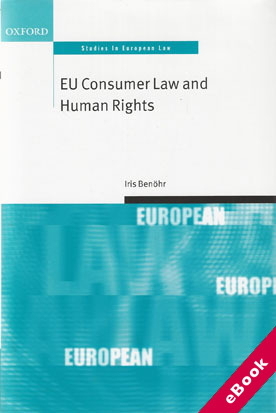
The device(s) you use to access the eBook content must be authorized with an Adobe ID before you download the product otherwise it will fail to register correctly.
For further information see https://www.wildy.com/ebook-formats
Once the order is confirmed an automated e-mail will be sent to you to allow you to download the eBook.
All eBooks are supplied firm sale and cannot be returned. If you believe there is a fault with your eBook then contact us on ebooks@wildy.com and we will help in resolving the issue. This does not affect your statutory rights.
Traditionally, consumer law has played an instrumental role in the EU as a tool for market integration. There are now signs in the new EU legal framework and jurisprudence that suggest this may be changing.
These changes can be seen in recent court cases and, above all, the Lisbon Treaty and the EU Charter of Fundamental Rights. The Treaty contains provisions affecting consumer law and, at the same time, it grants binding legal force to the EU Charter, which adds a fundamental rights dimension to consumer protection.
This evolution, however, is still at an early stage and may be thwarted by conflicting trends. Moreover, it may generate tensions between social objectives and economic goals.
This book provides the first comprehensive analysis of these developments and examines new avenues that may be opening for consumer law, focussing on three key areas: financial services, electronic communication, and access to justice.
Through a systematic analysis of relevant cases the book traces the development of a human rights dimension in consumer law and details the potential ramifications that the post-Lisbon legal framework may have on consumer protection and on related policy issues. This book concludes by providing ideas for a new legal approach to consumer law which strikes a compromise between social and economic demands.